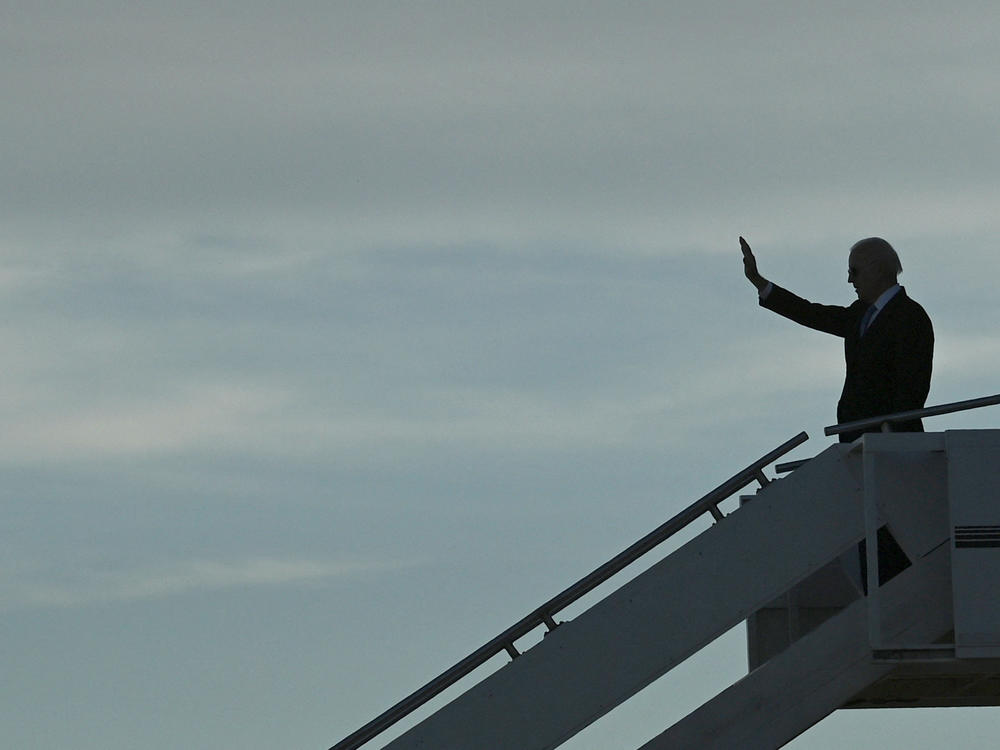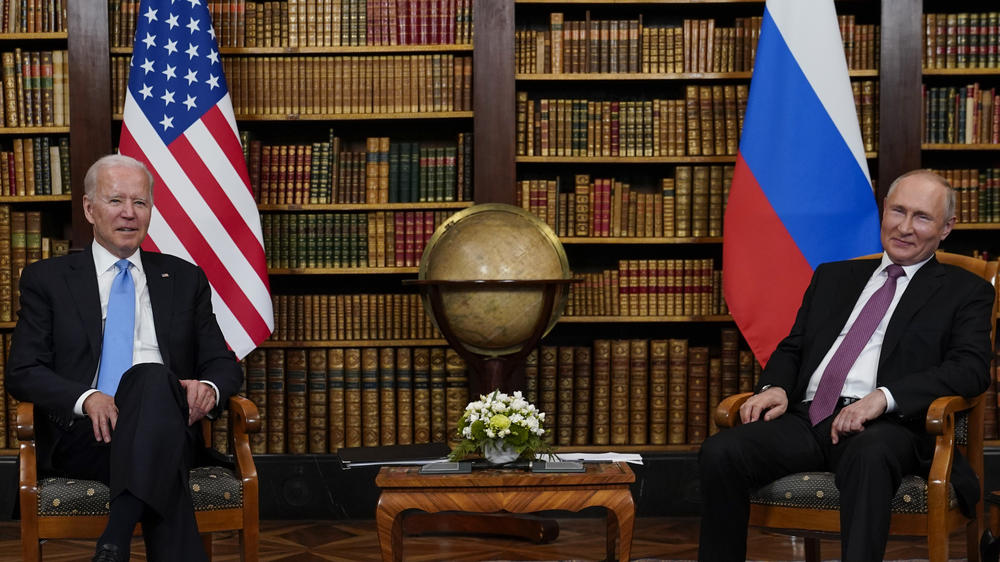Section Branding
Header Content
Opinion: We Don't Need A Biden Doctrine Dividing The World Into Good And Bad
Primary Content
Aaron David Miller (@aarondmiller2), a senior fellow at the Carnegie Endowment for International Peace, served for more than two decades as a State Department Middle East analyst, adviser and negotiator in Republican and Democratic administrations. He's the author of The End of Greatness: Why America Can't Have (and Doesn't Want) Another Great President.
Richard Sokolsky, a nonresident senior fellow at the Carnegie Endowment for International Peace, worked in the State Department for six different administrations and was a member of the secretary of state's Office of Policy Planning from 2005 to 2015.
Listening to President Biden these days, one can be forgiven for believing that the world is locked into a historic struggle between autocracies and democracies and that the fate of the 21st century — if not the planet itself — will be decided by the will and resolve of democratic nations to win that battle largely under America's leadership.
"It is clear, absolutely clear," Biden said in March, "that this is a battle between the utility of democracies in the 21st century and autocracies." He has repeated such remarks so often that they've begun to assume the worrisome form of a doctrine.
Biden's rhetoric is certainly understandable given his belief in U.S. leadership and the four years his predecessor spent undermining America's values, cavorting with dictators, dissing democratic allies and dumping all over multilateral institutions.
But this bipolar and ideological framing driven mainly by global competition with China, as well as with Russia, as the list of human rights abuses identified in Biden's recent summit with President Vladimir Putin suggests, is inherently flawed and likely to produce limited results or even prove counterproductive. If it is only rhetorical posturing or good politics at home to help America get over post-Trump stress disorder and stand tall again on the world stage, Biden will sooner or later be accused of hypocrisy and weakness as his words can't match deeds. But if he really means to make combating Chinese ideological influence the lodestar of U.S. foreign policy, he will have a very hard time convincing many other countries — including allies and partners that have important stakes in maintaining productive relations with China and Russia — to commit to the enterprise. He may well find that his approach will fail to marshal the diplomatic capital and resources it needs, risk driving Beijing and Moscow closer together, escalate rather than ease great power competition, push other countries to deepen ties with China and Russia and provoke both countries to take more aggressive steps to weaken democracies.
Perceptions of Cold War lite
Biden has said that he isn't talking about a new Cold War. But his rhetoric and actions will be perceived by autocratic adversaries as Cold War lite. The president made clear in a news conference in March that, on his watch, China will not reach its overall goal "to become the leading country in the world, the wealthiest country in the world, and the most powerful country in the world." And even more dramatically, Biden warned that preventing China from ruling the world will be key to the survival of the U.S.
This existential angst animated Biden's first trip to Europe, which was aimed not only at persuading the Group of Seven, NATO allies and the European Union that America is back, but also to mobilize America's friends in the face of the looming threat from China. It is not at all clear that the president closed the deal. Although tougher language on China appeared in summit communiques, some of America's allies were ambivalent about the anti-China language. French President Emmanuel Macron declared "the G-7 is not a club hostile to China," and German Chancellor Angela Merkel conceded that China is a rival but also "our partner in many aspects."
These qualms are not surprising. Trade between Europe and China is booming and many key countries in the Asia Pacific count China among their major trade, investment, manufacturing and technology partners; they have no intention of getting caught between the U.S. hammer and the Chinese anvil. It's unclear how many countries Biden can herd into the democratic camp.
Nor is it entirely clear what the goal of the effort is — to change China's and Russia's behavior? Demonstrate that democracies are superior to autocracies? Line up countries to choose democracy over autocracy? How much U.S. allies are prepared to contribute to Biden's Build Back Better World Partnership Initiative remains to be seen. The plan purportedly aims to fill gaps in China's Belt and Road Initiative, an ambitious network of infrastructure and trade projects spanning Asia, the Middle East, Africa and Europe that launched in 2013. Yet it is uncertain what the Biden version is truly supposed to achieve — and whether Congress, other countries and private companies will pony up the resources needed to compete with China's well-established BRI.
America deals with authoritarians
Progress cannot be made in tackling the most serious global problems, including climate change, pandemics, the proliferation of weapons of mass destruction and terrorism, without the cooperation of authoritarian states. The expansion of Chinese and Russian influence, and the defense of their own domestic political orders, are driven more by nationalist aspirations rather than ideological proclivities. The same is true for other autocracies and autocratic-leaning countries around the world. Trying to back these countries into an ideological corner increases the danger that they will take more aggressive steps to weaken democracies or seek security in numbers. To advance American interests, Washington and its democratic partners will need to find a way to work productively and pragmatically with these countries even while they don't measure up to U.S. democratic and human rights standards.
Indeed, the need to deal with authoritarian powers all over the world — and to cut deals with them — already muddies and confuses the bright line the Biden administration seems to want to draw between dictators and democrats. The administration is on the verge of reentering the Iranian nuclear accord. It is dealing with authoritarians in Egypt, the United Arab Emirates and Saudi Arabia to stabilize the conflict between Israel and the Palestinians. And it will likely at some point try to do nuclear diplomacy with the autocratic North Korean leader Kim Jong Un. Not to mention, the U.S. has close relations with countries like India, whose standards of democratic practice have declined precipitously in recent years. At a minimum, it will open up the administration to charges of hypocrisy when it comes to embracing autocrats or worse if the U.S. chooses not to engage with these countries.
Russia and China are not existential threats to the U.S.
The president would have the American public believe that Russia and China pose an existential threat to American democracy. They don't. This is not to trivialize for a minute Russia's predatory campaign of election interference, disinformation and cyberattacks. But the primary threat to the American Republic flows from the rot within — the anti-democratic Republican Party and the country's dystopian and dysfunctional politics, racism, polarization and economic inequality that have undermined self-governance. As for other democracies, China and Russia may be mucking around in their domestic politics, but the main drivers of democratic decline around the world have much more to do with poor governance, corruption, repression and the like.
China and Russia are U.S. adversaries — repressive authoritarians, serial human rights abusers who are determined to advance their own interests and block where they can any notion of a Pax Americana. The U.S. should cooperate with China when it serves U.S. interests; compete at all times by strengthening its own economy, capacity and resiliency at home, offering competitive and practical alternatives to China abroad; and contain and even confront Beijing if we must. But there's no need to dress all of this up in some Cold War-like ideological clash of systems certain to alienate both U.S. allies and adversaries and strip away the flexibility America needs to strengthen its influence on the world stage.
Copyright 2021 NPR. To see more, visit https://www.npr.org.



